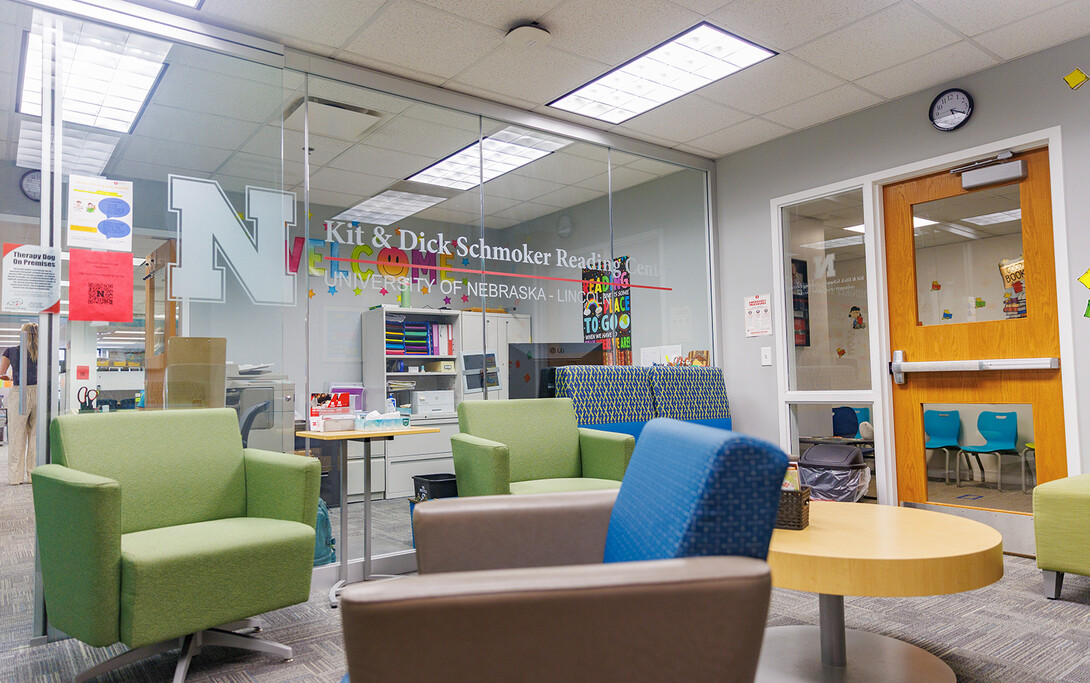
A semester tutoring in the University of Nebraska–Lincoln's Kit and Dick Schmoker Reading Center gave Lucas Timm a foundation in individualizing education and growing an understanding of students.
Timm, a senior elementary education major from Pender, Nebraska, said his experience, part of Practicum in Reading and Writing Disabilities (SPED 415A), taught him valuable lessons about meeting student needs. Timm and his student, a fourth-grader with dyslexia, developed a bond that deepened reading instruction.
“I got to target a bunch of different lessons toward her needs and help her read,” Timm said. “It really helped me learn how to work with students in a one-on-one setting.”
Husker students in the course were paired with a child and met with them twice a week throughout the semester to work on reading skills. The Schmoker Center provides individualized, one-on-one instruction to students who are reading below grade level, typically serving 45 to 90 students per semester.
Working with one student long-term helped Timm build a relationship and better understanding of his student to best cater the sessions to her. For the first few meetings, Timm said they did some activities to identify some of her interests, which gave him ideas for how to keep her engaged in learning.
“She was really into the show ‘Gravity Falls,’ so I would target some lessons and make it related so I could keep her interest in it,” he said.
This understanding of the student guided Timm as he put together lessons for his student. He would try to plan activities that played to her strengths to reinforce the reading lesson and keep her interested and enthusiastic.
“She was a big fan of math, so we would do games where I would make almost a code for her in numbers and she would have to decode it using letters,” Timm said. “As soon as she had a whole word, she would have to sound it out and figure out what the word is.”
There are some kids who come from less fortunate circumstances, and it’s nice to have a little extra attention outside the classroom. Sometimes a kid does get overlooked and it’s super important those kids get the extra help they need, whether it’s from that teacher or from an outside source like the reading center.
Timm appreciated the opportunity to gain experience working with a student individually. Practicum and student teaching experience typically involves working with large groups to prepare them for the classroom. But Timm said the tutoring experience prepared him for instructing future students who might need more assistance.
“Not only are they getting extra practice, but they’re also getting a person to talk to,” he said. “There are some kids who come from less fortunate circumstances, and it’s nice to have a little extra attention outside the classroom. Sometimes a kid does get overlooked and it’s super important those kids get the extra help they need, whether it’s from that teacher or from an outside source like the reading center.”
Timm said it was the “best feeling in the world” to watch his student grow over the semester. The children take a test at the beginning and end of the semester to monitor their progress, and his student improved in nearly every metric.
“It was really nice to be able to see that progress on paper,” Timm said.
Timm also learned from working alongside other future teachers. He could see exercises they were using and was inspired to try to modify some of them for his own student. One of his favorite activities was a scavenger hunt inspired by another future teacher working in the center. The child would read a clue, which would lead them to a spot in the building where they would find a reading activity that gave them the next clue. Timm said his student especially enjoyed this game.
“I could tell her problem-solving brain was firing on all cylinders,” he said. “It was really helpful to take a lesson somebody else had structured and then target it toward my kid.”
Timm will teach social studies and science and coach basketball at Mead Public Schools this fall. Timm’s experience tutoring in the Schmoker Reading Center gave him a clearer picture of how he wants to run his classroom.
“I take an empathetic approach,” he said. “That’s how I want to treat all the kids in my class in the future.”








